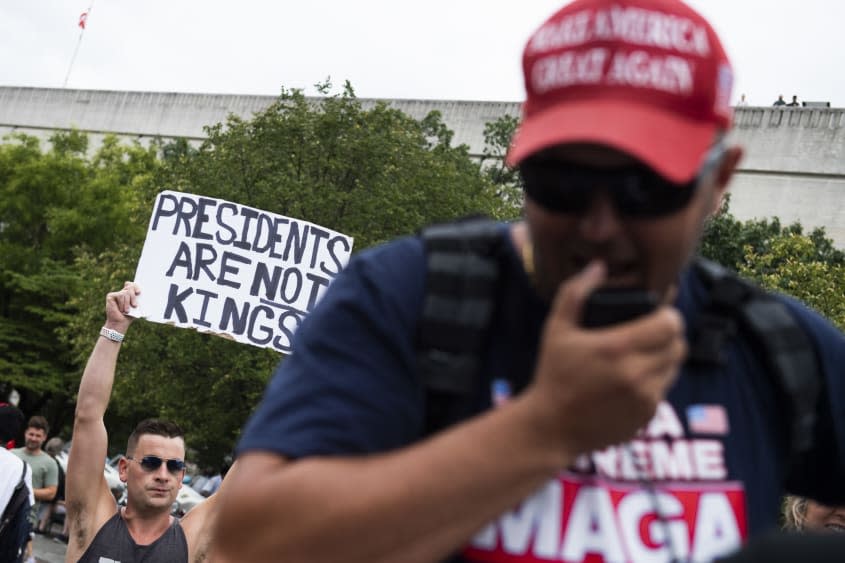Trump gambles on a 'free speech' defense strategy

- Oops!Something went wrong.Please try again later.
- Oops!Something went wrong.Please try again later.
If Donald Trump is anything, he is a man comfortable speaking aloud any and every thought that crosses his mind — whether or not it's in his best interest. He peppers his speeches with extended ad-libbed asides and non-sequitur riffs, often to the delight of his adoring audiences; his social media is rife with ruminations on everything from Hollywood romances to matters of national security; and now, facing perhaps the most significant criminal peril of his personal and professional life, Trump is betting that the very loquaciousness which contributed to his historic slate of criminal indictments may also be a winning legal strategy to keep him out of prison, and back into the White House.
This week, attorneys representing the former president against charges stemming from his alleged 2020 election interference argued that a request from prosecutors to limit the amount of evidence Trump could access and publicly disclose was a violation of his right to free speech. The request, made by Special Counsel Jack Smith's team, came after Trump posted "IF YOU GO AFTER ME, I'M COMING AFTER YOU!" on his Truth Social platform — a message prosecutors claimed was a sign that Trump was planning to "litigate this case in the media." Not so, claimed Trump's attorneys, who wrote that "the government seeks to restrict First Amendment rights" by asking to limit what evidence presented during the trial's discovery phase can be accessed and made public by Trump beyond "only genuinely sensitive materials."
Particulars of the debate over the requested "protective order" aside, the filing by Trump's attorneys is notable for offering a glimpse at their larger legal strategy: framing the former president's alleged election subversion as fundamentally a "trial about First Amendment rights."
"A showdown between two opposing assertions of principle"
The actions for which Trump has been charged were simply an example of the former president "exercising his right to talk about the issues and advocate politically for his belief that the election was stolen and was improperly run," attorney John Lauro told NPR recently, calling Smith's prosecution "the first time in the history of the United States where a sitting administration is criminalizing speech against a prior administration." Trump's legal team is essentially claiming that the former president had "every right to express views about election fraud that they say he believed, and still believes, to be true," The New York Times said, contrasting the strategy to prosecutors' focus on Trump's "pervasive and destabilizing lies" existing not simply as an expression of free speech, but in service of a larger criminal act. The charges against Trump, and his legal team's subsequent maneuvering are themselves a preview of a "showdown between those two opposing assertions of principle."
"Even assuming Trump knew his claims were false, there would still remain the controversial effort to link his false claims to the actions of others in challenging the election," attorney Jonathan Turley, who previously rejected the constitutional grounds for Trump's two impeachment trials, wrote in The Hill. "Even then," Turley added, "there remains the constitutional problem of criminalizing political lies."
Already a number of prominent conservative lawmakers and pundits have signed on to the Trump legal team's "free speech" framing. "President Trump had every right under the First Amendment to correctly raise concerns about election integrity in 2020," House Republican Conference Chair Rep. Elise Stefanik said in a statement after Smith's indictment was made public. Former Trump attorney Rudy Giuliani similarly claimed in an interview that Jack Smith's legacy will ultimately be one of "violating the right of free speech of an American citizen." Rep. Gary Palmer (R-Al.) claimed in a statement that "President Trump's statements are protected by the First Amendment right to free speech, especially political speech," and that the indictment "raises serious concerns about the public's right to speak openly in opposition to policies they oppose."
"The First Amendment doesn't shield fraud"
While the former president's free speech argument "might sound exciting to Trump's base," it's "likely to fall flat in court because speech in service of criminal conduct is not protected," MSNBC commentator Zeeshan Aleem wrote, highlighting the indictment's focus on Trump's having used "information he knew was false as part of a campaign to subvert the electoral process."
"There is no First Amendment privilege to commit crimes just because you did it by speaking," Duke University Law Professor and former federal prosecutor Samuel Buell concurred in the New York Times. "Tony Soprano can't invoke the First Amendment for telling his crew he wants someone whacked."
There is, in fact, Supreme Court precedent to that effect, Ciara Torres-Spelliscy, professor at Stetson Unversity law school, explained to NPR. Allowing that "the Supreme Court has been very lenient with liars" in general, Torres-Spelliscy pointed to the recent United States v. Hansen ruling, which made "really clear that the First Amendment doesn't shield fraud." No matter if Trump believed the lies about election fraud or not, he "simply did not have the legal authority to do what he is accused of doing, and he thus violated federal criminal law."
Ultimately there is legal precedent to placing limits on a president's First Amendment protections — made against Trump in regards to civil lawsuits stemming from the speech he made on Jan. 6 which allegedly incited the attack on the U.S. Capitol complex.
"Only in the most extraordinary circumstances could a court not recognize that the First Amendment protects a president's speech," Washington Federal District Court Judge Amit Mehta ruled in 2022. "But the court believes this is that case. Even presidents cannot avoid liability for speech that falls outside the expansive reach of the First Amendment. The court finds that in this one-of-a-kind case the First Amendment does not shield the president from liability."

